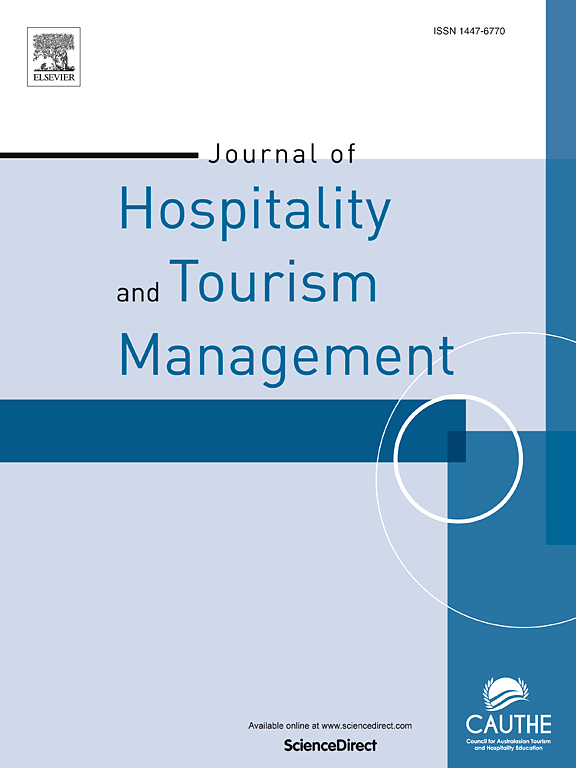旅游企业基于记忆的知识管理
IF 7.8
1区 管理学
Q1 HOSPITALITY, LEISURE, SPORT & TOURISM
引用次数: 0
摘要
以人为本的知识管理对服务密集型旅游企业的经营至关重要。然而,它的实际机制,往往被认为是非正式的和非结构化的,在现有的文献中仍然没有充分理解。这种模糊性阻碍了以人为本的有效知识管理策略的系统开发和应用。为了解决这一差距,本研究发展了旅游企业以人为本的知识管理理论,重点关注基层管理者和一线员工自发的“自下而上”知识管理活动背后的基本原理。本研究采用四阶段扎根理论方法,对中国三个地区(即三亚、广州和新丰)不同类型旅游公司的经理和员工进行了一系列半结构化访谈。数据收集和分析是迭代的,包括不断的比较和理论抽样,直到达到饱和。我们的研究结果表明,基层管理者认为实用知识是“值得记住/掌握的有用的东西”,这与员工的工作相关记忆密切相关。他们发展了基于记忆的知识管理概念、目标、策略和过程,包括扫描、编码、植入和加强与知识相关的记忆。这种以内存为中心的方法有效地满足了企业的知识需求,提高了知识管理效率,而无需过度依赖基于it的系统。本研究针对旅游业和其他“人对人”服务行业中以人为本的知识管理系统,提出了一种新的基于记忆的知识管理理论,强调了记忆过程在管理员工知识和知识相关行为中的作用。因此,它为形式化以人为本的知识管理实践提供了一个结构化的解释,弥合了现有知识管理研究与认知心理学理论之间的差距。本文章由计算机程序翻译,如有差异,请以英文原文为准。
Memory-based knowledge management in tourism firms
Human-based knowledge management (KM) is critical for the operation of service-intensive tourism firms; however, its practical mechanisms, often perceived as informal and unstructured, remain inadequately understood in existing literature. This ambiguity hinders the systematic development and application of effective human-based KM strategies. To address this gap, this study developed a grounded theory of human-based KM in tourism firms, focusing on the rationale behind spontaneous “bottom-up” KM activities among grassroots managers and frontline employees (FLEs). By employing a four-stage grounded theory methodology, this study conducted a series of semi-structured interviews with managers and FLEs from different types of tourism companies across three regions of China (i.e., Sanya, Guangzhou, and Xinfeng). Data collection and analysis were iterative, involving constant comparisons and theoretical sampling until saturation was reached. Our findings show that grassroots managers perceive practical knowledge as “useful things worth remembering/mastering,” linking it closely to FLEs’ job-related memories. They developed memory-based KM concepts, objectives, strategies, and processes, including scanning, encoding, implanting, and strengthening of FLEs’ knowledge-related memories. This memory-centric approach effectively meets FLEs’ knowledge requirements and enhances KM efficiency without relying excessively on IT-based systems. This study introduced a novel memory-based KM theory tailored to human-based knowledge management system in tourism and other “person-to-person” service industries, highlighting the role of mnemonic processes in managing employees’ knowledge and knowledge-related behaviors. Therefore, it provides a structured explanation for formalizing human-based KM practices, bridging the gap between existing KM research and cognitive psychology theories.
求助全文
通过发布文献求助,成功后即可免费获取论文全文。
去求助
来源期刊
CiteScore
13.30
自引率
8.40%
发文量
177
审稿时长
45 days
期刊介绍:
Journal Name: Journal of Hospitality and Tourism Management
Affiliation: Official journal of CAUTHE (Council for Australasian Tourism and Hospitality Education Inc.)
Scope:
Broad range of topics including:
Tourism and travel management
Leisure and recreation studies
Emerging field of event management
Content:
Contains both theoretical and applied research papers
Encourages submission of results of collaborative research between academia and industry.

 求助内容:
求助内容: 应助结果提醒方式:
应助结果提醒方式:


